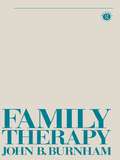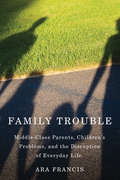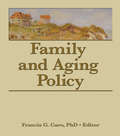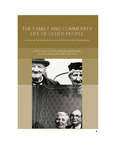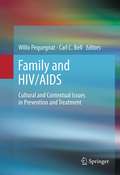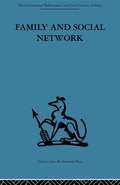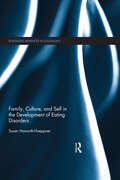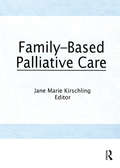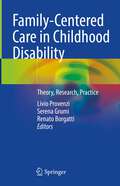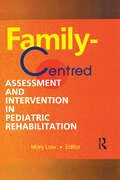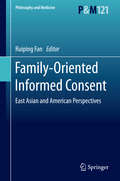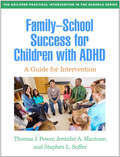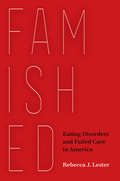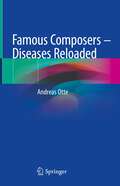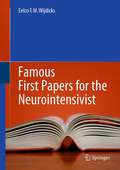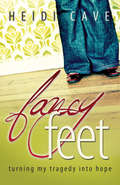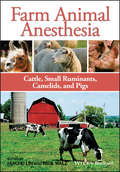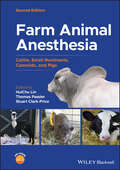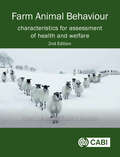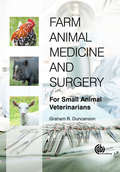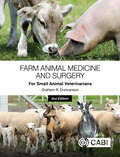- Table View
- List View
Family Therapy: First Steps Towards a Systemic Approach (Tavistock Library of Social Work Practice)
by John B BurnhamFamily therapy is a rapidly expanding field. This book introduces a range of concepts, skills and applications from a systemic approach. The first part sets out the theory and examines relationship types, the family life cycle, interactional sequences and different models of change. The next section puts the theory into practice. It describes verbal and non-verbal techniques which are used to elicit information and initiate change. The last part considers some of the necessary conditions for the successful integration and application of this approach in social work practice, illustrated by detailed case examples. A series of graduated exercises is designed to encourage readers to explore the theory and practice of family therapy in their own agencies.
Family Trouble
by Ara FrancisOur children mean the world to us. They are so central to our hopes and dreams that we will do almost anything to keep them healthy, happy, and safe. What happens, then, when a child has serious problems? In Family Trouble, a compelling portrait of upheaval in family life, sociologist Ara Francis tells the stories of middle-class men and women whose children face significant medical, psychological, and social challenges. Francis interviewed the mothers and fathers of children with such problems as depression, bi-polar disorder, autism, learning disabilities, drug addiction, alcoholism, fetal alcohol syndrome, and cerebral palsy. Children's problems, she finds, profoundly upset the foundations of parents' everyday lives, overturning taken-for-granted expectations, daily routines, and personal relationships. Indeed, these problems initiated a chain of disruption that moved through parents' lives in domino-like fashion, culminating in a crisis characterized by uncertainty, loneliness, guilt, grief, and anxiety. Francis looks at how mothers and fathers often differ in their interpretation of a child's condition, discusses the gendered nature of child rearing, and describes how parents struggle to find effective treatments and to successfully navigate medical and educational bureaucracies. But above all, Family Trouble examines how children's problems disrupt middle-class dreams of the "normal" family. It captures how children's problems "radiate" and spill over into other areas of parents' lives, wreaking havoc even on their identities, leading them to reevaluate deeply held assumptions about their own sense of self and what it means to achieve the good life. Engagingly written, Family Trouble offers insight to professionals and solace to parents. The book offers a clear message to anyone in the throes of family trouble: you are in good company, and you are not as different as you might feel...
Family and Aging Policy
by Francis G. CaroLearn how public policies can help families provide the care their elderly relatives needFamily and Aging Policy examines how public initiatives to assist the elderly in the United States, Canada, Singapore, Denmark, and Sweden can impact families who provide them with long-term care. For the majority of older people, the aging experience involves their families directly and indirectly, affecting income security, housing, and health care. This unique book addresses the aging issues that matter most to families struggling to deal with the demands of care giving and provides answers on how the public sector can help.As the traditional nuclear family becomes a memory and the notion of extended family disappears, the need for public interventions to help the elderly increases. A significant number of people grow old without families they can depend on. Others have families who want to help, but lack the financial means or the housing needed to provide care. Family and Aging Policy offers options on how families and formal services can share responsibilities, including how families can juggle jobs and care giving, the effects of the Family and Medical Leave Act, consumer-directed service options, community-based care programs, accessory dwelling units and zoning ordinances, and provisions for caregiver support in each of the 50 United States and the District of Columbia.Family and Aging Policy examines: extensive welfare programs in Sweden publicly funded home care programs in Denmark family-oriented social policies in Singapore shared responsibilities of families and formal services in Canada the Administration on Aging&’s National Family Caregiver Support program in the United States California Caregiver Resource Centers and much more!Family and Aging Policy is an invaluable tool for researchers and policy analysts working in family policy issues and as an essential supplemental text for course work in gerontology, sociology, family relations, and social work.
Family and Community Life of Older People: Social Networks and Social Support in Three Urban Areas
by Chris Phillipson Jim Ogg Miriam Bernard Judith and PhillipsFamily life has changed rapidly over te past fifty years and the number of people living longer increases year on year Family and Community Life of Older People revisits three areas (Bethnal Green in London, Wolverhampton in the Midlands and Woodford in Essex) which were the subject of classic studies in the late 1940s and 1950s and explores changes to the family and community lives of older people. The book examines issues such as:*changes in household composition*changes in the geographical proximity of kin and relatives*the extent and type of help provided by the family*contact and relationships with neighbours*relationships with friends*involvement in social and leisure activities*experiences of minority ethnic groups.These questions are explored through a unique set of data including census material, and survey data from interviews with over 600 older people. A key finding is that over the past 50 years we have moved from an old age experienced within the context of the family group to one shaped by personal communities in which friends may feature as significantly as immediate kin and relatives.Family and Community Life of Older People is a major contribution to the sociology of the family, of ageing, and of urban life and points up the social policy issues for an ageing society.
Family and HIV/AIDS
by Willo Pequegnat Carl BellThree decades into the HIV pandemic, the goals remain clear: reduce the number of infections,improve the health outcomes of those who are infected, and eliminate disparities in care. And one observation continues to gain credence: families are a powerful resource in preventing, adapting to, and coping with HIV. Recognizing their complex role as educators, mentors, and caregivers, Family and HIV/AIDS assembles a wealth of findings from successful prevention and intervention strategies and provides models for translating evidence into effective real-world practice. Chapters spotlight the differing roles of mothers and fathers in prevention efforts, clarify the need for family/community collaborations, and examine core issues of culture,ethnicity, gender, and diagnosis (e.g., minority families, adolescents with psychological disorders). Throughout, risk reduction and health promotion are shown as a viable public health strategy A reference with considerable utility across the health, mental health, and related disciplines,Family and HIV/AIDS will be a go-to resource for practitioners working with families, researchers studying at-risk populations, administrators seeking to create new (or evaluate existing)prevention and care programs, and policymakers involved in funding such programs.
Family and Social Network: Roles, Norms and External Relationships in Ordinary Urban Families (Reprint Series In Social Sciences)
by Elizabeth BottTavistock Press was established as a co-operative venture between the Tavistock Institute and Routledge & Kegan Paul (RKP) in the 1950s to produce a series of major contributions across the social sciences. This volume is part of a 2001 reissue of a selection of those important works which have since gone out of print, or are difficult to locate. Published by Routledge, 112 volumes in total are being brought together under the name The International Behavioural and Social Sciences Library: Classics from the Tavistock Press. Reproduced here in facsimile, this volume was originally published in 1957 and is available individually. The collection is also available in a number of themed mini-sets of between 5 and 13 volumes, or as a complete collection.
Family, Culture, and Self in the Development of Eating Disorders (Routledge Advances in Sociology)
by Susan Haworth-HoeppnerThis book takes a unique approach to the examination of the eating disorder, anorexia nervosa (and bulimia). White, middle-class, heterosexual women share their insights into the emergence of their illnesses through detailed interviews that consider perceptions of the role of family, the influence of cultural messages regarding thinness and beauty, the agency these women exert in the use of weight control to cope with life’s stressors, the meaning they attach to their eating disorders and how these issues together perpetuate their disease. The book uses a Symbolic Interactionist framework and a grounded theory approach to examine the narratives which emerge from these women’s stories. Themes of family, culture, and self arise in their narratives; these form the theoretical underpinnings for this book, and combine to shape the comprehensive model of eating disorders that emerges from this study. Haworth-Hoeppner’s book will appeal to researchers and advanced students of sociology, women’s studies, family studies, social psychology, and gender studies.
Family-Based Palliative Care
by Jane Marie KirschlingLearn to interact with families in ways that promote family functioning when a family member is dying. Family-Based Palliative Care is an insightful book that aims to increase professionals’understanding of the family as client. Authoritative contributors who are experienced in working with the terminally ill present the most current theory, practice, and research related to family-based care of hospice patients. Each readable chapter includes a wealth of information that can be applied to health care settings in which holistic care is a priority. The first chapter presents a conceptual framework for caring for families of the terminally ill as well as clinical examples that are used to illustrate the application of the framework in practice. Experts describe four research studies--two qualitative studies that examine sources of stress for caregivers and identify the resources used by families to manage at home; a methodological study that explores the positive and negative aspects of family caregiving; and a case study that evaluates a hospice staff’s efforts in providing family- based care.Because little research has been done with family caregivers of terminally ill hospice patients, Family-Based Palliative Care will be essential reading for nurses, social workers, hospice staff, and other professionals whose job it is to care for the dying and their families.
Family-Centered Care in Childhood Disability: Theory, Research, Practice
by Livio Provenzi Serena Grumi Renato BorgattiThe book presents a comprehensive and well-organized overview of the family-centered care approaches for child disability, and provides multi-professional contributions from the fields of psychiatry, psychology, and rehabilitation science. The volume is divided into three main sections, that highlights the theoretical basis, research evidence, and clinical implications of the family-centered approach to child care. Active engagement of parents in the therapeutic and rehabilitative journey of their children with disability is key to the success of early interventions and their long-term benefits. Research and clinical experiences in healthcare services around the world suggest that early supportive programs may promote children’s development at its best, with both clinical benefits and economic advantages for the healthcare system. This volume will appeal to a wide readership, from clinicians and researchers in child disability and rehabilitation, to students and professionals in the fields of psychiatry, psychology, and rehabilitation science.
Family-Centred Assessment and Intervention in Pediatric Rehabilitation
by Mary LawFamily-Centred Assessment and Intervention in Pediatric Rehabilitation analyzes the effectiveness of Family-Centred Services (FCS) for children with disabilities or chronic illnesses. This text provides you with the exact definition of FCS and offers proof that parent involvement in children's treatment greatly enhances therapy. You can use the suggestions and methods to integrate parents into therapy, maximizing the family's intervention experiences and making your work more successful and effective.Many clinicians agree that families play a crucial part in deciding what intervention strategies are best for their children. From this text, you will learn that listening to parents and valuing parental input will give you insight into the goals, needs, and ambitions families have for their children. This enables you to choose, with the parent, the interventions that best suit your patients’needs and the needs of their families. In addition to information on how to integrate parents and families into intervention, Family-Centred Assessment and Intervention in Pediatric Rehabilitation offers suggestions that will improve your existing FCS or help you implement a family- centred approach, including:performing therapy in natural settings, such as school or home, to make changes in the children's social and physical environmentsacknowledging the grieving and adaptation process of families while being compassionate and understandingletting parents describe what they would like their child to be able to do and accomplish in the future putting the parents’concerns and requests first, enabling parents to deal with caring for their child supporting parents and reinforcing them when they have innovative and helpful ideasinforming parents on the progress of their children and educating parents on methodologies and strategies used in FCSMany of the suggestions derived from the analysis of current data and original research in Family-Centred Assessment and Intervention in Pediatric Rehabilitation have immediate clinical applicability, allowing you to quickly adapt methods into your intervention processes. This text also provides you with information on types of evaluative methods, such as Measure of Processes of Care (MPOC) and Family-Centred Program Rating Scale (Fam PRS), that will help you determine if your FCS program is working efficiently. Emphasizing the goal of parent interaction in FCS services, Family-Centred Assessment and Intervention in Pediatric Rehabilitation offers methods that will improve your work with families and patients, making services more beneficial and relevant to the child and to their families.
Family-Oriented Informed Consent
by Ruiping FanThis volume addresses the proper character of patient informed consent to medical treatment and clinical research. The goal is critically to explore the current individually oriented approach to informed consent which grew out of the dominant bioethics movement that arose in the United States in the 1970s. In contrast to that individually oriented approach, this volume explores the importance of family-oriented approaches to informed consent for medical treatment and clinical research. It draws on both East Asian moral resources as well as a critical response to the ways in which the practice of informed consent has developed in the United States
Family-School Success for Children with ADHD: A Guide for Intervention (The Guilford Practical Intervention in the Schools Series)
by Thomas J. Power Jennifer A. Mautone Stephen L. SofferDistilling decades of research, this practical manual presents an innovative intervention for families of 6- to 10-year-olds (grades 1–5) with attention-deficit/hyperactivity disorder (ADHD). Family–School Success (FSS) focuses on improving children's behavior and academic performance by strengthening parent–child, teacher–student, and family–school relationships. Detailed guidelines are provided for implementing FSS with parent groups or individual families, including how to involve children in groups and collaborate with teachers. The authors discuss ways to deliver FSS effectively in school- and clinic-based settings, private practice, and primary care. In a convenient large-size format, the book features dozens of reproducible parent handouts and worksheets, assessment tools, and fidelity checklists, which can also be downloaded and printed. This book is in The Guilford Practical Intervention in the Schools Series, edited by Sandra M. Chafouleas.
Famished: Eating Disorders and Failed Care in America
by Rebecca J. LesterWhen Rebecca Lester was eleven years old—and again when she was eighteen—she almost died from anorexia nervosa. Now both a tenured professor in anthropology and a licensed social worker, she turns her ethnographic and clinical gaze to the world of eating disorders—their history, diagnosis, lived realities, treatment, and place in the American cultural imagination. Famished, the culmination of over two decades of anthropological and clinical work, as well as a lifetime of lived experience, presents a profound rethinking of eating disorders and how to treat them. Through a mix of rich cultural analysis, detailed therapeutic accounts, and raw autobiographical reflections, Famished helps make sense of why people develop eating disorders, what the process of recovery is like, and why treatments so often fail. It’s also an unsparing condemnation of the tension between profit and care in American healthcare, demonstrating how a system set up to treat a disease may, in fact, perpetuate it. Fierce and vulnerable, critical and hopeful, Famished will forever change the way you understand eating disorders and the people who suffer with them.
Famous Composers – Diseases Reloaded
by Andreas OtteThe life and death, but also the creative work of famous musicians is closely linked to their personal medical histories. In "Famous Composers – Diseases Reloaded" these case histories are vividly reconstructed on the basis of authentic biographical testimonies and closely linked to the personalities of the musicians. The latest research findings on the pathophysiology of these composers will be woven into the overall picture. Was Paganini's "devilishness" caused by a hereditary disease? Did Scarlatti have strange signs of illness on his fingers? What did Bach really die of? How did "Christel" from a dubious milieu change Schumann's entire life? What aggravated Ravel's underlying illness so that he did not complete a single composition in the last five years before his death? How did Tárrega manage to play the guitar again after his stroke with hemiplegia? Did the Brazilian Villa-Lobos' worldwide reputation help him live longer thanks to the best treatment available to him? Andreas Otte, physician and musician, has incorporated the latest medical history research into the composers' pathographies. This book is an exciting and "well-tempered" reading experience not only for physicians, music lovers, musicologists and musicians, but for all readers who want to develop a basic understanding of the pathophysiology and life scores of these great masters under current conditions from today's perspective.
Famous First Papers for the Neurointensivist
by Eelco F.M. WijdicksA major contribution to the literature in neurology from renowned neurointensivist Eelco F.M. Wijdicks, MD, PhD, Famous First Papers for the Neurointensivist presents and critically assesses numerous papers that have made a profound impact on the diagnosis and treatment of neurologically acute conditions. In general, there has been little historical work in acute neurologic conditions, precisely because neurology is not perceived through this perspective. Famous First Papers for the Neurointensivist addresses this problem by a scholarly treatment of early descriptions of clinical signs, syndromes and presenting the development of treatment of these acute disorders. Using a uniform and easy-to-read format, the title offers a clear reproduction of each paper's title page, a short historical note, and a brief discussion and its implications, and a final comment to provide perspective. Landmark clinical trials that apply to acute neurology are included, and the book also briefly discusses the birth of intensive care units. Ground-breaking and indispensable for all physicians and researchers interested in neurocritical care, Famous First Papers for the Neurointensivist is a unique, original reference, providing not only a single source for discovering the most important papers in the field but also a critical analysis of the impact of each paper on the development of neurocritical care. Dr Wijdicks has been integral to the growth and development of neurocritical care as a specialty. He has cultivated it firsthand, serving as a contemporary of Raymond Adams, C. Miller Fisher, and Allan Ropper, all pioneers in acute neurological care. He established the neurocritical care program at the Mayo Clinic in the early 1990s and has served as the editor in chief of the journal Neurocritical Care, which was first published in 2004 after the foundation of the Neurocritical Care Society. His unique vantage point allows him to bring us a book that few others could produce, Famous First Papers for the Neurointensivist. This book is an original in the field and should be on the reading list of anyone who cares for critically ill neurologic and neurosurgical patients... Reading this book from cover to cover is highly recommended. The writing is clear and concise, and the transitions are smooth. Each essay is self-contained and allows the reader to set his or her own pace. Once completed,the book serves as a great reference book because each essay stands on its own. The photographs of the manuscripts' title pages and key tables and figures are of high quality, and a translation is provided if the original work was not in English... Dr Wijdicks has sifted through the library stacks and has emerged with a book that puts the specialty of neurocritical care into historical perspective. In order to know where you are going, you must first know where you have been. This holds especially true for neurocritical care because the specialty continues to grow and flourish. -- JAMA NEUROL/VOL 70 (NO. 4), APR 2013 WWW. JAMANEURO.COM
Fancy Feet
by Heidi CaveA team of firefighters fought to save Heidi's life after a horrific accident that killed her best friend, burned over 53 percent of Heidi's body, and claimed both her legs. The following year followed countless surgeries, surviving, pain management, fighting, and loss. Until she finally faces the driver who changed her life, Heidi realizes she has one last hurdle: forgiveness.Heidi Cave is a well-respected advocate for burn survivors and amputees, and serves on a board of advisors for the BC Professional Fire Fighters' Burn Fund's efforts to build a research laboratory and treatment center in Vancouver.
Farm Animal Anesthesia
by Paul Walz Huichu LinFarm Animal Anesthesia: Cattle, Small Ruminants, Camelids, and Pigs presents practical guidance on using anesthetic and analgesic drugs to prevent pain caused by surgery or disease. This cohesive resource offers complete coverage of anesthetics and anesthetic techniques in farm animals with a focus on practical applications. Providing thorough information on pain management and residues, the book also covers specific techniques for common surgical procedures and considerations for animals with pathophysiological conditions.The book includes chapters on preanesthetic considerations, anesthetic drugs, chemical restraint and standing sedation, injectable anesthesia, inhalant anesthesia, local techniques, specific procedures, pain management, residues, and euthanasia. Farm Animal Anesthesia is a useful guide for farm animal practitioners, veterinary students, and researchers working with these species.
Farm Animal Anesthesia: Cattle, Small Ruminants, Camelids, and Pigs
by HuiChu Lin Thomas Passler Stuart Clark-PriceA completely revised and updated reference for farm animal anesthesia, sedation, and pain management In the newly revised Second Edition of Farm Animal Anesthesia: Cattle, Small Ruminants, Camelids, and Pigs, distinguished veterinarians Drs. HuiChu Lin and Paul Walz deliver a practical and easy-to-use manual for techniques associated with anesthesia and pain management in farm animal species. The authors incorporate advances in surgical and diagnostic techniques, with the latest drugs and equipment, updated images, and new technique descriptions added throughout the book. Reflecting their newfound popularity, Farm Animal Anesthesia offers additional and updated information on drug combinations and anesthetic techniques relevant to small ruminants and potbellied pigs. New chapters and topics on paralytic drugs for complete muscle relaxation, ventilators for advanced orthopedic and ophthalmological surgeries, updated local and regional anesthetic techniques, and comprehensive standing surgery and diagnostic procedures have been added. Readers will also enjoy access to a companion website with video clips demonstrating techniques described within. The book also includes: A thorough introduction to general preanesthetic considerations for ruminants, camelids, including alpacas and llamas, and potbellied pigs A comprehensive exploration of commonly used preanesthetics and injectable anesthetics, including anticholinergics, sedatives, tranquilizers, analgesics, and injectable anesthetics Practical discussions of standing sedation and chemical restraint, including new drug combinations for reliable restraint and remote drug delivery In-depth treatments of the use of neuromuscular blocking drugs and monitoring in farm animals Perfect for farm animal practitioners, veterinary surgeons, veterinary anesthetists, and researchers, Farm Animal Anesthesia is also an indispensable resource for veterinary students and residents in surgery and anesthesia seeking a one-stop, practical reference to farm animal anesthesia.
Farm Animal Behaviour
by Ingvar EkesboAnimal behaviour is the basis for ascertaining their welfare and is a topic of ever growing importance. This textbook is organised into three sections covering all major farm animals of the world, both mainstream and specialist: large farm animal species (horses, cattle, swine, sheep and goats), poultry and farmed birds and non-domesticated animals such as deer. Each chapter describes the elements of behaviour of a particular species in a clear and uniform format. Background to domestication, innate and learnt behaviour, social behaviour, mating behaviour, activity patterns, senses, behaviour in the young animal, vision and hearing are all covered for each species. Understanding of ethological knowledge is both a necessary aid for getting correct diagnoses, but also for the assessment of health and welfare in the single animal or a group of animals, making the book valuable for veterinary practitioners as well as students at university and tertiary level.
Farm Animal Behaviour: Characteristics for Assessment of Health and Welfare
by Ingvar Ekesbo Professor Stefan GunnarssonCompletely updated and revised, Farm Animal Behaviour 2nd Edition continues to provide essential information on normal and stereotypic behaviours in a wide variety of farm animals to help in the assessment and diagnosis of their health and welfare. Comprehensive coverage of a range of farmed animals from: horses, cattle, sheep, goats and pigs through to domesticated poultry, deer, ostrich and many other species. Innate, learned and social behaviours are described together with activity, vision and hearing to build a picture of normal behaviours presented in a clear and consistent way for each species. Stereotypic behaviours, injuries and disease, resulting from improper management practices, are outlined in detail. For the second edition Professor Stefan Gunnarsson joins the author team and contributes his long-standing knowledge, clinical and scientific expertise. Many new snapshot photographs in full colour throughout have been added to further illustrate behaviours as they occur. New information on normal and stereotypic behaviours is included. The explosion in new research is captured with a wealth of new references and pointers for further reading. A consistent approach to each species allows for easy comparison. Farm Animal Behaviour 2nd Edition provides a comprehensive yet concise background for all students, postgraduates and practitioners in veterinary medicine, animal science, welfare and ethology.
Farm Animal Behaviour: Characteristics for Assessment of Health and Welfare
by Ingvar Ekesbo Professor Stefan GunnarssonCompletely updated and revised, Farm Animal Behaviour 2nd Edition continues to provide essential information on normal and stereotypic behaviours in a wide variety of farm animals to help in the assessment and diagnosis of their health and welfare. Comprehensive coverage of a range of farmed animals from: horses, cattle, sheep, goats and pigs through to domesticated poultry, deer, ostrich and many other species. Innate, learned and social behaviours are described together with activity, vision and hearing to build a picture of normal behaviours presented in a clear and consistent way for each species. Stereotypic behaviours, injuries and disease, resulting from improper management practices, are outlined in detail. For the second edition Professor Stefan Gunnarsson joins the author team and contributes his long-standing knowledge, clinical and scientific expertise. Many new snapshot photographs in full colour throughout have been added to further illustrate behaviours as they occur. New information on normal and stereotypic behaviours is included. The explosion in new research is captured with a wealth of new references and pointers for further reading. A consistent approach to each species allows for easy comparison. Farm Animal Behaviour 2nd Edition provides a comprehensive yet concise background for all students, postgraduates and practitioners in veterinary medicine, animal science, welfare and ethology.
Farm Animal Medicine and Surgery
by Graham R DuncansonSmall animal veterinarians are increasingly taking on caseloads that include farm animals, with cases being presented by local hobby farmers, smallholders, and 'novelty pet' owners. Recognising this trend, this book provides a quick reference guide for small-animal orientated veterinarians in the basics of surgery and treatment of farm animals. Popular animals such as cattle, sheep, goats, camelids and backyard poultry are covered, and basic techniques such as anaesthesia, clinical examination techniques, breeding, surgery and euthanasia are discussed. This book provides a quick-reference format, ideal for looking up information during a consult, useful for veterinarians in small and mixed practices and those less familiar with animals such as alpacas which have seen an increase in popularity. Also ideal as a refresher guide and as a continuing professional development resource.
Farm Animal Medicine and Surgery for Small Animal Veterinarians: For Small Animal Veterinarians
by Dr Graham R DuncansonSmall animal veterinarians are increasingly taking on caseloads that include farm animals, with cases being presented by local hobby farmers, smallholders, and 'novelty pet' owners. With the increase in veterinary telemedicine, they now also receive requests for advice electronically from owners further afield. Recognising this trend, this book provides a quick reference for small-animal orientated veterinarians in the basics of surgery and treatment of farm animals. Popular animals such as cattle, sheep, goats, pigs, camelids and backyard poultry are covered, and basic techniques such as anaesthesia, clinical examination techniques, breeding, surgery and euthanasia are discussed. This new edition: - Expands on recent developments in all areas of medicine and surgery, covering advances such as the increased use of ultrasound across species and adding a new section on anthelmintics. - Provides updates on current major disease threats, as well as providing a One Health perspective. - Includes full colour images to help bring the subject to life. Ideal for looking up information during a consult, or for use as a refresher guide and continuing professional development resource, this book is an important tool for veterinarians in small and mixed practices.
Farm Animal Medicine and Surgery: For Small Animal Veterinarians
by Graham R DuncansonSmall animal veterinarians are increasingly taking on caseloads that include farm animals, with cases being presented by local hobby farmers, smallholders, and 'novelty pet' owners. Recognising this trend, this book provides a quick reference guide for small-animal orientated veterinarians in the basics of surgery and treatment of farm animals. Popular animals such as cattle, sheep, goats, camelids and backyard poultry are covered, and basic techniques such as anaesthesia, clinical examination techniques, breeding, surgery and euthanasia are discussed. This book provides a quick-reference format, ideal for looking up information during a consult, useful for veterinarians in small and mixed practices and those less familiar with animals such as alpacas which have seen an increase in popularity. Also ideal as a refresher guide and as a continuing professional development resource.
Farm Toxicology: A Primer for Rural Healthcare Practitioners
by William J. Meggs Ricky L. LangleyThis book provides healthcare workers practicing in rural areas with the practical knowledge necessary to diagnose and treat farm workers who develop an acute or chronic illness. In rural settings, distances and travel times may be prolonged, leading to delays in assessment and definitive treatment. Healthcare providers must be prepared to rapidly assess the ill farm worker, formulate a differential diagnosis, and initiate treatment. The volume begins by teaching the reader to formulate a comprehensive differential diagnosis of farm worker illnesses, including stings and bites, green tobacco syndrome, infections, and heat and weather-related events, as well as exposures to the numerous chemicals found on the farm. The toxicity of various farm products, such as insecticides, herbicides, rodenticides, and petroleum products, are each discussed in their own chapter, enabling the reader to rapidly obtain vital information on their mechanism, clinical signs and symptoms, and differential diagnosis. The reader will learn to utilize information on pesticide labels and safety data sheets, including proper use of personal protective equipment. Chapter authors discuss a variety of other topics, including toxic gas exposures on the farm, disease associations with chronic chemical exposures, illicit drug use, and miscellaneous conditions that a rural practitioner should be familiar with that may occur on the farm, such as heat and cold injuries, lightning strikes, allergies, and asthma. Farm Toxicology: A Primer for Rural Healthcare Practitioners will be an invaluable resource for rural healthcare providers, including paramedics, triage nurses, physician assistants, nurse practitioners, and physicians, who need to quickly evaluate and treat ill farm workers.
